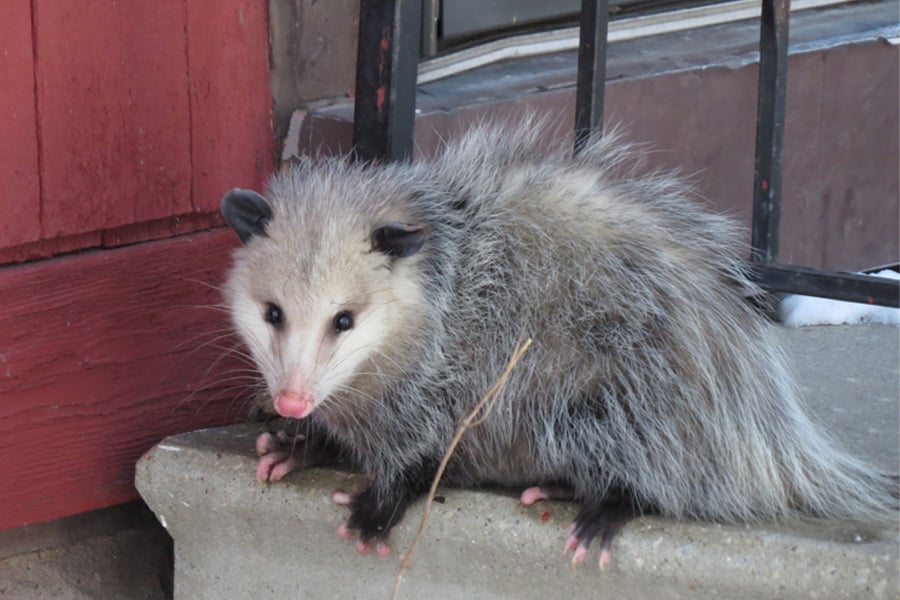Living With Opossums
This page provides problem-solving advice and ways to make your yard less attractive to opossums in the first place.

Dens
Prevention
The best way to prevent an opossum from establishing a den in your yard is to keep it away from attractive areas from the start. Use welded wire to block access to crawl spaces and areas under decks, sheds, patios and porches.
Eviction Techniques
If an animal has already established a den, try the techniques below, preferably two or three at the same time. After a few days, pack crumpled newspaper into the entrance. If the animal is still there, it will pull the paper out. If the paper stays in place for a few days, repair any openings.
- Place flashlights, flood lamps, blinking holiday lights or a constantly noisy device such as a radio, alarm clock or toy in the den. Leave them on day and night — or at least at night to disturb the animal’s sleep.
- Place ammonia-soaked rags in the den for one week. Resoak the rags daily, and pack crumpled newspaper in the entrance to hold in the fumes. Never use ammonia between March and August; it can harm infants too young to escape.
Window Wells
One way to get an opossum out of a well is to place a rough board at a 45-degree angle inside the well. If you do not have a rough board, wrap a towel or carpeting around a board to provide traction. Make sure it’s long enough to reach the top. Place fish-scented cat food or cheese at the top of the ramp to entice the opossum, which may not leave until night.
If that doesn’t work, tie a rope to the handle of a 5-gallon bucket. Place food inside the bucket, and lower it into the well. Place the bucket on its side so that the opossum can walk inside. Once the opossum is inside, slowly raise the bucket and place it on the ground on its side with the opening away from you so that the opossum can walk out.
How to Make Your Yard Less Attractive
- Never feed opossums.
- Keep pet food and water dishes inside.
- Keep grills and barbecues clean.
- Keep garbage cans inside. If this is not possible, pour 1 cup of ammonia inside each can, sprinkle black pepper on the top bag, or place ammonia-soaked rags on top of the lids and secure them with bungee cords.
- Use closed compost bins.
- Keep the ground below bird feeders and fruit trees clean.
- Install a 4-foot-high wire fence around your garden. Leave the top 12 to 18 inches unsecured and bent outward. If an opossum tries to climb the fence, its weight will pull the top down and land the animal back on the ground.
- Spray plants with a mixture of 1 gallon of water and 2 tablespoons of hot sauce or garlic puree. Reapply after a heavy dew or rain.
What You Should Never Do
- Trapping and removing an animal is not always the solution to the problem. Removing the animal is illegal without the proper permits and only creates an open space for another animal to inhabit. A trapped adult may also leave young behind to die of starvation. Focus on removing the attraction, not the animal.
- Never move young from a den.
- Never use poisons. They’re inhumane and may be illegal. They can also result in secondary poisoning of other wild animals or pets.
- It’s illegal to keep wild animals, even for a short time. They have special nutritional, housing and handling needs, and inexperienced individuals who try to raise or treat them inevitably produce unhealthy, tame animals that can’t survive in the wild.
Public Health Concerns
Opossums are not a public health concern. They may carry rabies, but there have not been any reports in DuPage County in recent years.